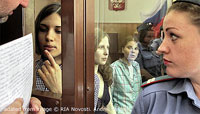Pussy Riot and the party line: Why was Samutsevich set free? The answer is simpler than you think

(Moscow News – themoscownews.com – Anna Arutunyan – October 15, 2012) Sometimes, the best indication of what’s going on in Russian politics and Pussy Riot is clearly a case of Russian politics comes from simply reading the official line. Forget the experts and the oppositionists, just turn on the TV, curb your instinctive vitriol, and try to take the powers that be at face value, for they are human and often reveal a lot more than they intend to.
The sudden release last week of Yekaterina Samutsevich on probation, aside from the partial relief that at least one member of the group was out of pre-trial detention, had the effect of baffling anyone who’s been paying attention to Pussy Riot out of their wits.
As often happens when people are baffled out of their wits, some of the more radically minded oppositionist bloggers cried foul and insinuated that the release resulted from some sort of “betrayal” of the Pussy Riot cause. It was as though the women were better suited to fight against the closeness of the Church to the State by staying in jail (and on some weird, twisted level, there may be something in that logic but I’ll return to it later).
But in the gabfest that ensued, the one question that still remains shrouded in mystery was why Samutsevich was released while Nadezhda Tolokonnikova and Maria Alyokhina will remain to serve out their two-year term. And why, also, the two jailed members of Pussy Riot issued their strongestworded statement yet distancing themselves from art activist Pyotr Verzilov, ex-husband of Nadezhda Tolokonnikova, who has been busy promoting Pussy Riot’s cause.
On Tuesday, Oct. 10, just as the news about Samutsevich was hitting the airwaves, I started getting some pretty revealing emails from the most unexpected of sources the pro-Kremlin United Russia Party.
Why the country’s ruling political party facing one of its biggest challenges in eight years with Sunday’s gubernatorial elections would need to weigh in on Pussy Riot’s appeal hearing was initially beyond me. Nevertheless, top brass issued a statement that Pussy Riot’s firebrand lawyer, Mark Feygin, was using the trial as self-promotion at the expense of his clients. This note, arriving just minutes before Samutsevich’s sentence was changed to probation, had the strange effect of confirming that we were, in fact, witnessing a political trial what other reason did United Russia have to comment on the hearing, other than that it was invested in the outcome?
Ensuing emails seemed to confirm this hypothesis: another United Russia official praised the court’s ruling for being “lawful” (which has the unintended tinge of condescension, like a school teacher addressing a truant student who’s finally showed up to class).
And then this gem of a statement landed in my mailbox: “According to [deputy secretary of the General Council Andrei Isayev], when Samutsevich expressed her repentance over what happened, her punishment was changed to a suspended sentence.”
Repentance? I scoured Pussy Riot’s statement for any trace of religious humility in the face of the State and the Court, and of course I found none. Nor was lawyer Irina Khrunova’s carefully worded appeal statement where she pointed out that Samutsevich never got a chance to take part in the dancing and singing in Christ the Savior Cathedral indicative of any repentance or admission of guilt. No, don’t expect Samutsevich to backtrack on her politics fresh out of jail, she is keen to continue the fight and to join the opposition.
So why was United Russia talking about repentance? Because that was exactly how it wanted to spin Khrunova’s defense strategy. And that tells us something else not only was the political elite invested in the outcome of last week’s appeal hearing, it wanted leniency just as the Russian Orthodox Church indicated that it wanted leniency when it called on President Vladimir Putin to pardon Pussy Riot just hours after the initial Aug. 17 verdict. The government in this case the Moscow City Court which heard the appeal seemed to be grasping for any possible pretext to get at least one member out of jail while saving face why?
Because it recognizes that Pussy Riot is going to have a much harder time fighting Putin’s regime if the group is set free and that would be a good thing both for the women of Pussy Riot and for Putin.
